Anime Review: O Maidens in Your Savage Season
- Joseph Lutholtz
- Nov 10, 2019
- 11 min read
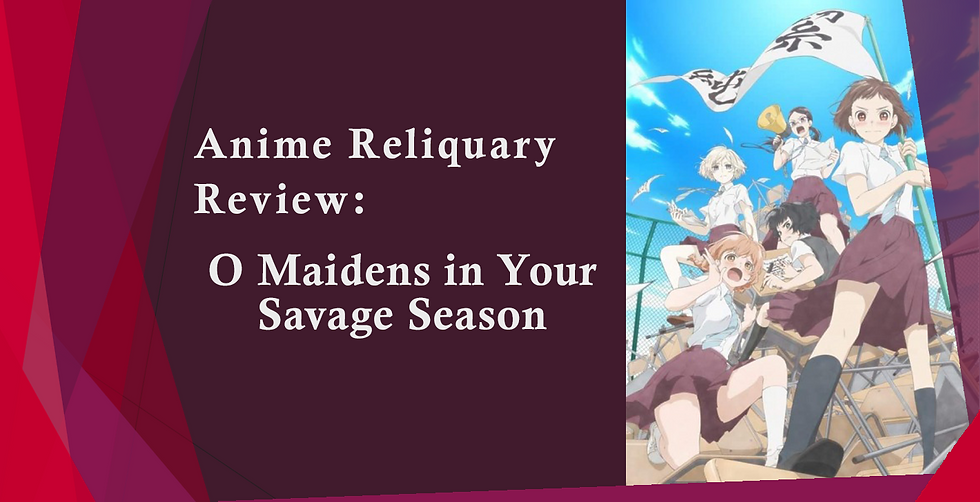
Alternative Names: Araburu Kisetsu no Otome-domo yo., Maidens of the Savage Season
Score: 7/10, 4/5
Length: 12 Episodes
Genre: Shoujo, Drama, Romance, Comedy, School Life
Availability: Available subbed on HiDive
Cringe and discomfort are two aspects of storytelling I generally dislike and try to avoid whenever possible. In some special instances, though, I recognize the importance of discomfort and its role in forcing people to reevaluate their perspectives. Watching or reading things that unnerves us forces us to push our boundaries and acknowledge thoughts or experiences that might not align with our own. For example, Scum's Wish was an incredibly discomforting show that almost seemed to revel in how badly its cast of characters could screw up their lives and the lives of those around them simply because of their misguided or unrequited affections. Despite my dislike of its general content, though, it still ended up being one of the most gorgeous and well-written shows in a season stacked with some of my personal favorites. O Maidens in Your Savage Season, runs off of a very similar reliance on cringe and discomforting melodrama to tell a story of five young girls wrestling with their budding sexuality while clinging to the childish puritanical beliefs they grew up with. In other words, on top of the struggle of dealing with this show's melodramatic flair, I also had to contend with a harsher perspective I wasn't really prepared to deal with--that of girls dealing with the mess that is puberty.
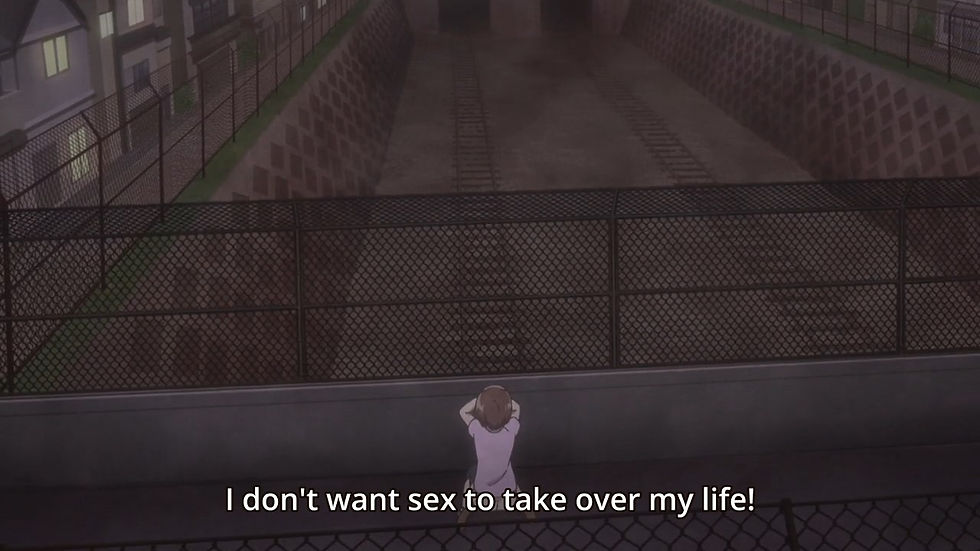
For whatever reason, watching a bunch of teenage girls clumsily talk around and obsess about sex just bothers me.
Rather than taking the same route as Scum's Wish and turning the difficulties and emotional turmoil of puberty into something dark and edgy, though, O Maidens uses those themes to offer something lighter and more comedic in tone. No matter how bad things get, there's rarely ever any doubt that things will still turn out well for the cast but watching this group of socially-awkward and inept girls bumble through life offers some unfortunate nostalgia for anyone who managed to survive those years with the emotional scars to prove it. From agonizing over the thought of buying "adult" underwear to virtue signaling and acting the prude to hide their embarrassment, almost every mistake and personal struggle these girls deal with will be especially reminiscent for fellow late-bloomers. Familiar and traumatizing as their actions are, though, the show strives to make it blatantly obvious that its brand of comedic drama is aiming more for hyperbole than reality as things escalate to incredible levels. One of the best examples of this fact and the main, inciting event that gets this mess of a drama rolling comes when the show's central character, Onodera Kazusa, finds herself refusing to believe that her childhood friend, Norimoto Izumi, is even remotely interested in sex. To Kazusa, Izumi has always been the sweet, innocent, and obsessive dork who loves trains so much that he barely has room for anything else in his mind--never mind that he's grown into one of the most popular and attractive boys at school. Just as she's agonizing over these thoughts and is bringing him some leftovers since his mom is working late that night, though, she walks in on him jerking it to some train molestation porn. Understandably shocked and embarrassed by all of this, Kazusa flees the scene and races through town screaming the whole way ass she realize that almost everything in the world looks like genitalia. This shocking event then sets off the avalanche of personal realizations and a comedy of errors full of sexual frustration and some fairly scathing criticisms of Japan's obsession with purity and the innocence of youth.
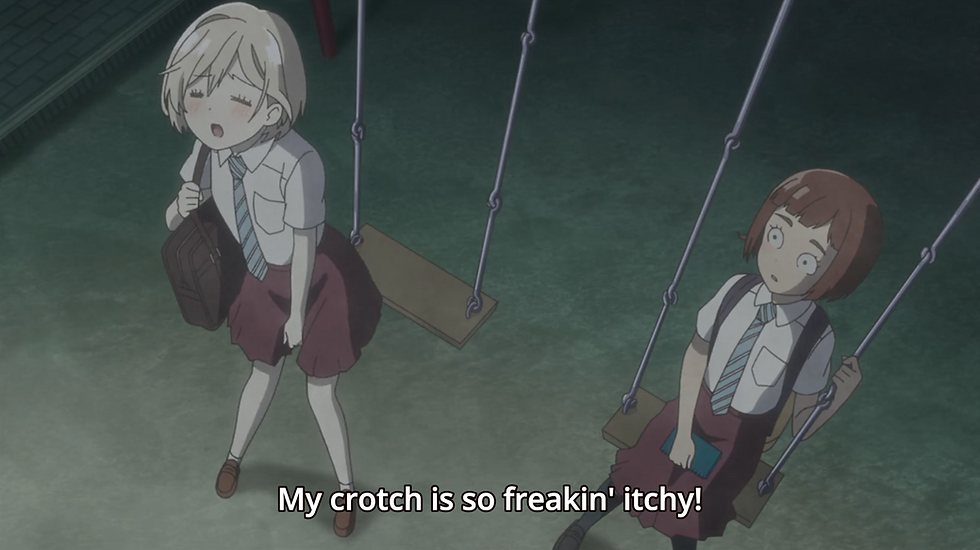
At times, it's almost like a more serious and down-to-earth version of Shimoneta.
The degrees and angles from which the show deals with this commentary and comedy vary greatly between each of the cast members though. While they and their individual stories are all connected, each of the main characters offer a different take on how their upbringing and social environment came to affect their identities and first loves. Kazusa and Izumi's budding relationship, for example, is more or less what you'd expect of your average "childhood friends" romance. Their story is one full of stutter-stop progression, "will-they, won't-they"s, and awkward moments as they constantly doubt their own feelings and test the boundaries of their friendship. Where the actual drama of their relationship comes from, though, isn't really the testing of those feelings and boundaries so much as the fact that neither really know how to talk to each other or anyone else about these new feelings. Izumi, for his part, generally functions like your standard dense boy with no clue how his actions or inaction might affect Kazusa. Even when he finally admits and understands his feelings for her, he gets so stuck in his own head and wrapped up in ideas about being "kind, "fair", and "gentle" with Kazusa that he just leaves her hanging out of the fear that he might hurt her. This, of course, only leaves the awkward and insecure Kazusa to assume that he doesn't have feelings for her or that it might be kinder and better for him if she just ignored her own feelings and let someone else take him since, according to Izumi's admirers, she's out of his league. Pair that insecurity with the confusion of having to basically reevaluate her understanding of who Izumi is now, her inability to talk to the opposite sex, and the anxiety of not knowing how to deal with what her feelings might eventually lead to and Kazusa is also ends up having plenty of excuses not to risk their friendship.
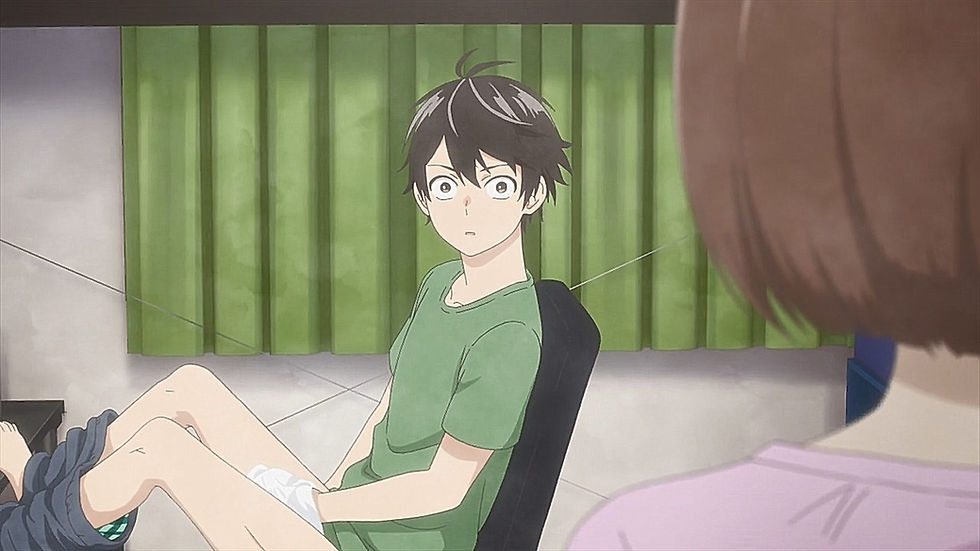
Not to mention that she has to deal with reliving THIS every time she sees him.
The story of Sonezaki Rika and her relationship, however, is one that speaks more toward the perspective of those who have aggressively dug into their puritanical upbringing as a form of protection. Characterized initially for being an antagonistic prude, a large portion of her character arc and romance is dedicated mainly to essentially "taming the shrew," albeit in a far less abusive and sexist manner. As opposed to one of Shakespeare's more controversial plays, O Maidens goes out of its way to explain, rationalize, and resolve Sonezaki's bitter, holier than thou attitude toward everyone. Namely, after being bullied for several years and laughed at for being too plain or outright unattractive, she started to cave under the keering of her peers and actually believes them since, after all, they all seem to have the happiness and romance that she secretly desires. Unwilling to take the abuse without a fight, though, she warps her lack of romance into a sign that they're all just sex-obsessed, morally bankrupt idiots. All of that starts to change, though, when two people try to befriend her and help her break out of her shell of feigned superiority. The first is a sexually active gyaru that tries to meet Sonezaki person-to-person, convincing her through kindness that there's nothing wrong with having sex with someone you love--no matter what society says. The second is the class clown who tries to save her from a fresh round of bullying by turning everyone's attention on him, claiming that he actually thinks her height and slim figure makes her look like a model. When he later comes to outright admit that he likes Sonezaki, though, the walls she put around herself finally crumble. Her path to recovery from that point on is far from ideal since she spends almost every second trying to second-guess her boyfriend's intentions or outright hide their relationship from the rest of the cast but at least she's making a conscious effort to get better.
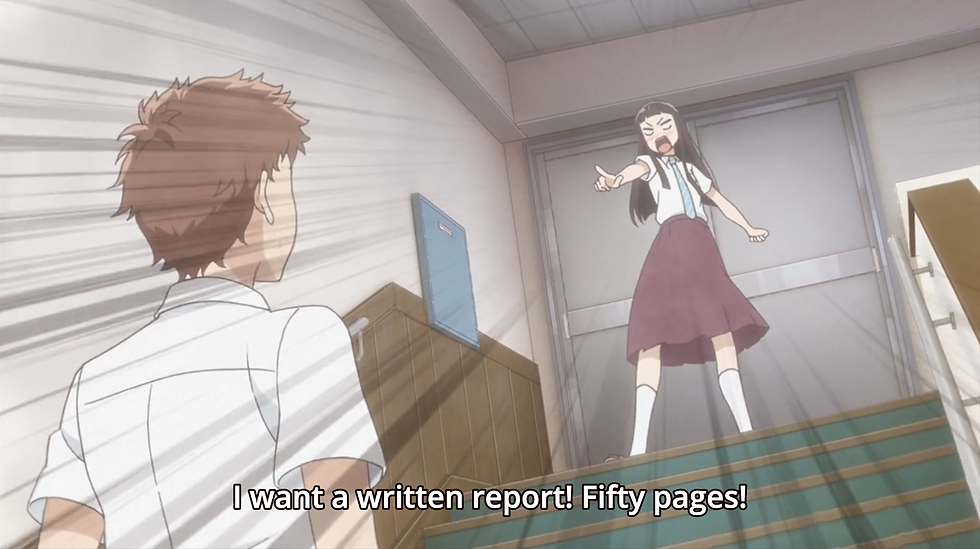
Luckily, unlike Kazusa and Izumi, neither Sonezaki or her boyfriend have any trouble speaking their mind and talking things out.
Now, for better and worse, those are really the only two romances in this series that are simple and straightforward. Every other one features some significantly more problematic story beats or messages. The romance of the literature club's resident author, Hongou Hitoha, for example, hinges on her repeatedly trying to seduce her teacher, Yamagishi Tomoaki, so she can get material for what she hopes will be her debut in erotic fiction. Despite his repeated refusals and complaints, though, Hongou eventually convinces him to along with her advances if only to force this sly but shy girl to give up on this absurd idea on her own. As if that general set-up weren't problematic enough, though, the manner in which their "relationship" develops is little more than a game of sexual chicken. Rather than just giving in to get it over with, Prof. Yamagishi insists that they start out with what amounts to humiliation-play where he'll ask her to try various indirect methods to get a rise out of him, claiming that is she can't even deal with that then she's nowhere near ready to have sex with someone like him. For example, of the earliest demands he makes is that she flash her panties at the back of the school while he watches from one of the stairwells inside. The idea here is that she'll hopefully chicken out because someone else might see her as well. Failing that test, though, Hongou still refuses to give up on her scheme and plots out numerous other ways to make him give in to her womanly charms. To top off this mess of bad decisions, though, it should be noted that, despite his supposed reticence toward this game of theirs, Prof. Yamagishi does still go out of his way to mock and look down on Hongou in a manner he knows will bother her immensely, making his almost predatory behavior feel far more intentional than he claims.
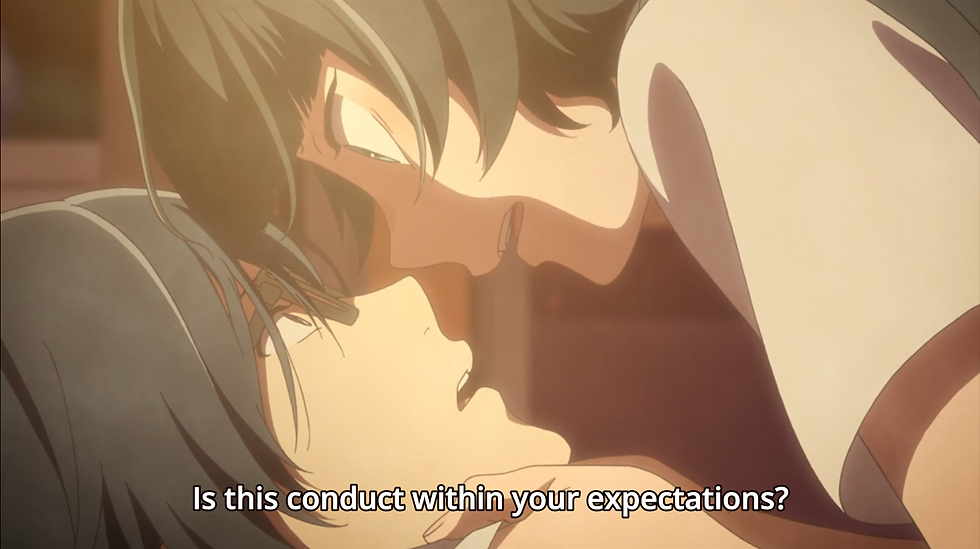
If his goal is to ensure high school girls have no interest in him, he's definitely going about it the wrong way.
If you thought that was bad though, ho boy, I don't even know where to begin with the various stories and issues surrounding the Lit. Club's early-blooming beauty, Sugawara Niina. Hyperbolic as is might sound, Niina is the core of almost every complaint and issue I have with this series. Hongou and Yamagishi's game of chicken might be problematic but it doesn't hold a candle to the myriad problems with her life and personality. Yet, almost like a kind of trade-off for that fact, Niina's romance and character arc is also the most directly critical of Japan's obsession with innocence and youth. Rather than being a story of budding romance and happy endings, Niina's perspective offers an example of how an obsession with romance and sexuality can go very, very wrong. Namely, having been awakened to her innate sexuality at a very young age thanks her pedophile theater mentor, Niina spends most of the series looking for dramatic and sexual stimulation from others the same way her instructor sought the same things from her. Put another way, what Niina ultimately seeks is validation of her innate sexuality and for her instructor's attentions now that she's grown enough to make him lose interest in her. Of course, finally finding who could offer her that stimulation would also offer her a degree of smug satisfaction since it would mean she finally crossed the line that he refused to since, in his own words, laying his hands on her would destroy the childish innocence he craves. To make matters worse, though, Niina injects a layer of dark melodrama along the same lines as Scum's Wish when she finds an ideal partner in Kazusa's childhood friend, Izumi. This revelation, then, sets off a cascade of hypocrisy, NTR-tinted moments, and melodrama that nearly pushed me to give up on this show. Where most of the show's female cast generally operate on an underlying level of trust, friendship, and a willingness to help one another, Niina exists as the toxic viper of the group--using her own smug, self-assured superiority to actively prey on Kazusa's insecurities and guilt her into letting her have Izuumi despite claiming previously that she hates it when people assume that she's trying steal their significant others. Yet as much as I grew to loathe her very existence and the frankly vile melodrama she added to the series, I can't deny that her perspective serves as a perfect example of how damaging it can be for children to be idolized and made aware of their "innocence" and the sexuality that that innocence conversely implies before they're mentally developed enough to handle that information.

Chirst, Niina might be an absolute mess but damn if her additions to the story and
its themes aren't compelling and necessary on some level.
Last but not least, though, there is the similarly disparate but far more positive perspective of the Lit. Club's fifth member and Kazusa's best friend, Sudou Momoko. For a large portion of the series, Momoko is presented more like a support character for Kazusa than a perspective character in her own right. Most of her interactions with the story early on center on her trying to support her best friend's feelings for Izumi and a desire to grow closer to the cool, beautiful Niina. When she finds a potential romance of her own, though, the opportunity for her to finally take center stage still comes and goes without any particular growth on her part. Instead of falling for this boy and finding the same romantic happiness as Kazusa and Sonezaki, every second she spends with him clearly feels like torture for her. As his advances and her rejections grow more violent, though, a single, simple thought comes to mind: she's just not interested in guys at all, let alone this self-entitled shitbag. And just like that, her obsession with growing closer to Niina takes on a very different tone. Rather than wanting to grow closer out of some kind of idol-worship typical of many female pairs in anime, both we, the audience, and Momoko herself realize that her feelings for Niina are romantic more than anything else. There is also some idol-worship to it as well, but this revelation forces her to come to terms with feelings she fears are abnormal since they are, at least in her mind, different from those her friends are all dealing with. Now, normally I'd criticize this kind of characterization as being unrealistic given how loud and contentious gay rights have become in Japan but the fact that Momoko is forced to deal with this personal revelation while under the thumb of a very conservative and puritanical community gives her lack of knowledge some amount of credibility. After all, there are a lot of people out there who never manage to recognize their orientation or opt to remain in the closet because of the communities they live in. So, regardless of how the series ends for her, Momoko's perspective and the representation she offers comes as a pleasant surprise in this otherwise homosexual-focused series.
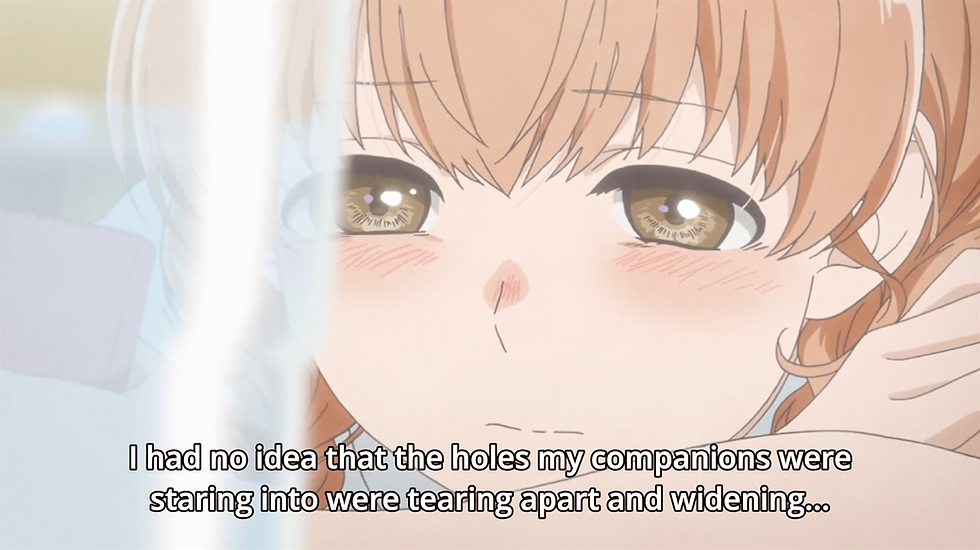
It is, honestly, my sincere hope that things turn out well for her in the end, though. She deserves
some happiness after all the bullshit the rest of the cast put her through.
Whether or not you'll like this series, I think, is mainly going to depend on your tolerance for melodrama and some of those more problematic issues. As I already mentioned, even I considered dropping this series thanks to Niina's contributions. Even with its gorgeous art and great sound track, all of that meant nothing when I started to chafe at the story itself. Yet, to be fair though, I wasn't so much interested in this story and its romantic gimmicks that fall just shy at being introductions for a hentai so much as what the story and its characters' perspectives had to say about the life of young women in Japan. After all, knowing the works that author, series composer, and now director, Mari Okada, went on to make after this manga, I'm fairly certain that I was supposed to focused more on that social commentary than the gimmicks that kept the series' drama and comedy running. Still, there's always the possibility that I missed the point of this series or the message of a particular character arc entirely. If you feel that's the case, I'd love to hear your thoughts on the matter. If you haven't seen this show, though, and my criticisms and interest in the bigger picture didn't scare you off, I'd recommend giving it a shot if you share my interest in topical, controversial works or what ultimately amounts to a solid teenage soap opera.


Comments